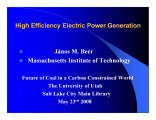TO
1 - 25 of 13
| Title | Date | Subject | Description | ||
|---|---|---|---|---|---|
| 1 |
 |
Utah State 1 - Plate 4 | 2014 | oil yeild; Green River Formation; well log; core log | |
| 2 |
 |
Welcome and Introduction: 2009 Western U.S. Oil Sands Conference | 2009-02-27 | oil sands industry; industrial combustion; gasification technology research; CO2 capture technologies; coal; OxyFuel Combustion; chemical looping; gasification; oil shale/sands | Summary of challenges facing U.S. oil sands industry and the role of the Institute for Clean and Secure Energy at the University of Utah in addressing those challenges, presented at the 2009 Western U.S. Oil Sands Conference by Philip Smith, Professor, Department of Chemical Engineering and Director... |
| 3 |
 |
Federal control of greenhouse gas emissions | 2010-04-28 | greenhouse gas emissions; federal control efforts; domestic legislation | Federal Control Efforts: 1) International 2) New Domestic Legislation 3) Using Existing Domestic Legislation |
| 4 |
 |
Carbon capture and sequestration: A regulatory gap assessment - Topical report | 2012-04 | carbon capture and sequestration; gap assessment; CCS; climate change | Though a potentially significant climate change mitigation strategy, carbon capture and sequestration (CCS) remains mired in demonstration and development rather than proceeding to full-scale commercialization. Prior studies have suggested numerous reasons for this stagnation. This Report seeks to e... |
| 5 |
 |
High efficiency electrical generation | 2008-05-23 | efficiency of electrical generation; electrical generation; fossil fuel energy resources; mitigatint GHG emissions; CO2 capture and sequestration | Outline: 1-Electricity outlook and fossil fuel energy resources. 2-Technology options for mitigating GHG emissions. 3-CO2 cpature and sequestration. 4-Costs. 5-Concluding remarks. |
| 6 |
 |
2012 Unconventional fuels conference introduction | 2012-05-15 | unconventional fuels; computational simulation and pilot-scale experiment; unconventional resources; emissions minimization; CO2 regulation; CO2 coal research | Presentation given at the 2012 Unconventional Fuels Conference. |
| 7 |
 |
Clean and secure energy from domestic oil shale and oil sands resources: Quarterly progress report - April 2013-June 2013 | 2013 | domestic oil sands; domestic oil shale; ICSE; unconventional fuels development; life-cycle analysis | The Clean and Secure Energy from Domestic Oil Shale and Oil Sands Resources program, part of the research agenda of the Institute for Clean and Secure Energy (ICSE) at the University of Utah, is focused on engineering, scientific, and legal research surrounding the development of these resources in ... |
| 8 |
 |
Clean and secure energy from domestic oil shale and oil sands resources: Quarterly progress report - January 2013-March 2013 | 2013 | clean energy; domestic fuels; oil shale resources; oil sands resources; CO2 management; liquid fuel procuction; in-situ thermal processing; oil shale processing | The Clean and Secure Energy from Domestic Oil Shale and Oil Sands Resources program, part of the research agenda of the Institute for Clean and Secure Energy (ICSE) at the University of Utah, is focused on engineering, scientific, and legal research surrounding the development of these resources in ... |
| 9 |
 |
Policy issues associated with using simulation to assess environmental impacts | 2014-11 | oil and natural gas technology; policy issues with using simulation; environmental impacts; simulation-based science; judicial assessments and models; environmental policymaking | This report examines the relationship between simulation-based science and judicial assessments of simulations or models supporting evaluations of environmental harms or risks, considering both how it exists currently and how it might be shaped in the future. This report considers the legal standard... |
| 10 |
 |
Land and resource management issues relevant to deploying in-situ thermal technologies: Topical Report: October 1, 2009 to December 31, 2010 | 2011-01 | in-situ; oil shale; domestic energy source; oil sands | Utah is home to oil shale resources containing roughly 1.3 trillion barrels of oil equivalent and our nation's richest oil sands resources. If economically feasible and environmentally responsible means of tapping these resources can be developed, these resources could provide a safe and stable dome... |
| 11 |
 |
A technical, economic, and legal assessment of North American heavy oil, oil sands, and oil shale resources: In response to Energy Policy Act of 2005 Section 369(p) | 2007-09 | Oil sands; Oil shale; Heavy oil; Energy Policy Act; 2005; Climate Change; Petroleum; Oil Cost; United States; North American heavy oil; Utah Heavy Oil Program; UHOP; World economic development; Energy; Canadian oil sands; Unconventional resources ;Technical; Economic; Legal assessment | Against the backdrop of world population growth, rapid economic expansion in the world's most populous countries, challenging political climates in many oil-producing nations, and the specter of climate change, worldwide energy consumption is projected to increase from the 2004 level of just over 40... |
| 12 |
 |
Policy analysis of water availability and use issues for domestic oil shale and oil sands development: Topical Report: October 1, 2009 to March 31, 2010 | 2010-03 | oil shale/sands resources; energy source; unconventional fuels; water demands; water availability; domestic oil shale/sands development; topical report | Oil shale and oil sands resources located within the intermountain west represent a vast, and as of yet, commercially untapped source of energy. Development will require water, and demand for scarce water resources stands at the front of a long list of barriers to commercialization. Water requiremen... |
| 13 |
 |
Regulatory promotion of emergent CCS technology - Topical report | 2014-01 | CCS technology; climate change; mitigation strategies; carbon capture and sequestration | Despite the growing inevitability of climate change and the attendant need for mitigation strategies, carbon capture and sequestration (CCS) has yet to gain much traction in the United States. Recent regulatory proposals by the U.S. Environmental Protection Agency (EPA), limited in scope to new-buil... |
1 - 25 of 13
